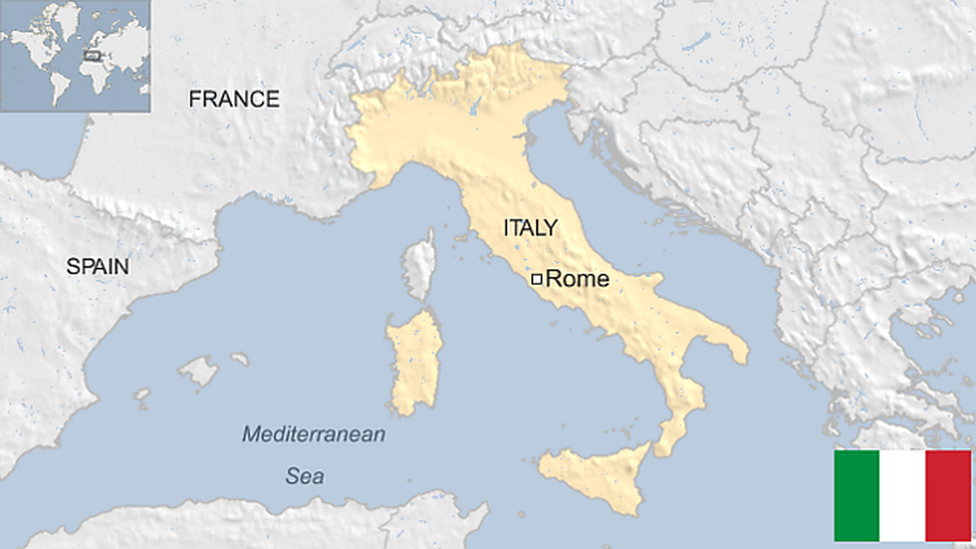Jobless young Italians face life on the black market
- Published
Young and jobless in Italy
Finding a job in Italy is hard enough, but it's only part of the battle. Many, especially the young, can find work only "on the black" - employed in the shadow economy, without a contract or the rights that go with it.
But after years stuck in this trap, Stella Sermoneta has had enough. She has decided to learn how to make pizza, a skill recognised and valued around the world. With this new skill, she hopes to find a new life overseas, perhaps in Israel or the US, where she has relatives.
She has a job in Rome, working in a call centre, but she has no contract. She's employed illegally - "on the black".
"If you work without a contract, you can't have lots of normal things like a new house because the bank doesn't give mortgages without a contract," she says.
"You can't spend money on normal things because you don't know where you are going to be tomorrow."
A black job won't give her a reference for her next step up the career ladder, and she doesn't feel she can start a family without more security.
She says more than half her friends are in a similar position, and the only way out for her is to emigrate.
Unpaid taxes
The dire position of Italy's young in the job market was highlighted in August, when the rate of unemployment among 18 to 24-year-olds hit a record high, external of 40.1%. It's not clear how many young people are working informally, but Italy's black economy is known to be large.
According to a study by Prof Friedrich Schneider of Johannes Kepler University of Linz in Austria, the shadow economy in Italy makes up a fifth of the country's entire GDP, higher than the EU average, and higher than Spain or Portugal.
Italy's financial police, the Guardia di Finanza, are doing what they can to crack down on it.
Last year they identified 30,000 illegal workers, of whom about 16,500 were employed completely on the black, with no contract whatsoever.
"Fighting undeclared work is important as it harms and undermines many interests," says Lt Col Cosimo Virgilio of the Guardia di Finanza.
"It hurts the state and the national budget, because it means taxes aren't paid. And our purpose is also to protect honest businesses. Those that comply with the law suffer unfair competition from other companies which are able to sell their goods and services at lower prices."
The problem is more concentrated in Italy's poorer south, with sectors dominated by seasonal or casual work such as restaurants, hotels and other service industries like call centres or care homes.
Stefano Ferraina, who runs a job centre in the south of Rome, confirms that working on the black has long been a feature of Italian working life.
"It was once a short-term, temporary bridge," he says, "to fill the gap between education and a permanent job that would give the opportunity to start a family and create a future.
"Now, unfortunately, this has increasingly become the only opportunity available."
Death threats
High employment taxes are one reason why it's tempting for employers to hire on the black. For every euro an employer spends on hiring a worker, 48 cents goes on taxes and social security payments, and only 52 cents into the employee's pocket. Cut out the taxes and payments, and workers look a lot cheaper.
On top of this, a raft of regulations makes it unattractive for Italian employers to give young workers proper contracts.
"Older workers are much more protected," says Pietro Reichlin, a professor of economics at Rome's LUISS University.
"It is much more difficult for firms to get rid of staff if they are unproductive, or to make their contracts more flexible. So it is much easier for young guys to get employed with contracts that are not officially registered."
To solve this problem, he says, Italy could look to reduce this burden of tax and regulation. But changing the rules around employment is a slow and difficult process in Italy.
In 1999 and 2002, professors working as advisers to the government were murdered by left-wing paramilitaries opposed to labour market reform. Death threats have been made to advisers of the current government.
Stella understands why employers hire people on the black. "You're not angry because you know what is behind the black market. They can't afford all the payments. They have to live too."
But it's yet another barrier between Italy's youth and a career that allows them to fulfil their dreams.
- Published4 October 2023
